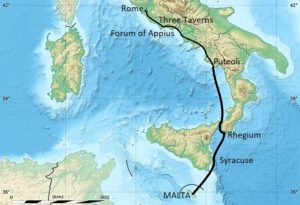GOD’S WORD FOR YOU
ACTS 28:11-16
11 After three months we put to sea in a ship that had wintered in the island. It was an Alexandrian ship with a figurehead of the Dioscuri. 12 We put in at Syracuse and stayed there three days. 13 From there we had to tack, and arrived at Rhegium. After one day a south wind came up, and on the second day we reached Puteoli. 14 We found some brothers there who invited us to spend a week with them, this was how we came to Rome. 15 The brothers there had heard that we were coming, and they traveled as far as the Forum of Appius and Three Taverns to meet us. Seeing these men encouraged Paul, who thanked God. 16 When we arrived in Rome, Paul was allowed to live by himself, with a soldier to guard him.
The Dioscuri were the Greek and Roman twin gods Castor and Pollux, the patron “saints” of Romans sailors. Ancient sailors thought that the phenomenon known as St. Elmo’s fire was an appearance of the Dioscuri. Ships in those days took their names from their figureheads, so we know that Paul and Luke would have referred to this Alexandrian vessel by its Greek name, the Dioscuri.
Since it was now early March, conditions were open to sailing once again. They found a good wind and got to Syracuse on the east coast of Sicily. They spent three days there, perhaps waiting for a better wind, but they set out and made a maneuver that was remarkable enough for Luke to record it, but perhaps so remarkable that its meaning is uncertain today. There is a question of the text, since some witnesses have peri-elontes “we cut away the anchor” (which seems to make little sense) but other witnesses have peri-elthontes “we made a circuit,” or made some roundabout way of sailing. It is unlikely that they sailed all the way around Sicily (some 450 miles) instead of sailing just 70 miles north to get to Rhegium on the tip of Italy’s boot. It’s likely that here peri-elthontes means to sail by tacking into the wind, which fits the text and the context well. Tacking is a method of sailing into the wind by zigzagging.
It is there, just beyond Rhegium, that ships face the famous hazards of the whirlpool of Charybdis and the treacherous Rock of Scylla. Messina is the port on the north end of these dangers. Those from my generation who did not receive a classical education might remember a reference to “Scylla and Charybdis” in the second line of the song “Wrapped Around Your Finger” by the Police. To avoid these dangers, ships had to wait for the best wind, and it would seem that the Dioscuri found the perfect south wind after only one day. They ran the dangers and entered the Tyrhennian Sea with its idyllic, bluer-than-blue waters. In Roman times, only grain ships were allowed to run with a top hamper of sails (that is, topsails as well as mainsails and royals) into the main port of Puteoli. Since the Dioscuri was a grain ship (Alexandria was the main grain depot of North Africa) they would have made good time with their south wind.
Christian brothers got news of Paul’s approach after the passengers left the ship in Puteoli, and they were met by groups of Christians in some towns along the way. The Forum of Appius was a usual stopping-point for travelers to and from Rome, filled (according to Horace) with “sailors and cheating innkeepers.” The word “tavern” (Latin taberna) means both “tavern/inn” and “small shop.” There is a small village near my city which has two bars and a gas station that could justly be called “Three Taverns” in the Latin sense.
It’s easy to sympathize with Luke as he writes the line, “This was how we came to Rome.” Paul was allowed a place to live, with a guard, until such time as he could be taken to Caesar.
This passage preaches the law by showing us that Paul submitted to his status of being under arrest without trying to escape, although he probably had ample opportunities while they met groups of Christians along the beautiful southern coast of Italy. This was Paul’s obedience to the Fourth Commandment. The Apostle submitted to God’s will for him to go to Rome even though it meant personal hardship, discomfort, humiliation, and even danger. As Job said, “Shall we accept good from God, and not trouble?” (Job 2:10). And Paul did not worry about how long this road took, as the proverb says: “It is not good to have zeal without knowledge, nor to be hasty and miss the way” (Proverbs 19:2). So Paul obeyed God’s will and God’s word, keeping the First and Third commandments as well.
This passage preaches the gospel by showing how God was with Paul and the others just as he had promised. “Not one of all the good promises the Lord your God gave you has failed. Every promise has been fulfilled” (Joshua 23:14; cp. Psalm 145:13). The Lord has also promised that in the end he will carry you home to be with him in heaven (John 14:3). If the Lord could keep Paul and Luke safe through hurricane and shipwreck, he can keep you safe through disease, dementia, distance and any other disaster. “Blessed are all who take refuge in him” (Psalm 2;2).
In Christ,
Pastor Timothy Smith
Listen or watch Bible classes online. Go to splnewulm.org, click on “Watch Worship Live” and scroll to the bottom of the page for archives of sermons, audio Bible studies and video Bible studies.
Additional archives by Wisconsin Lutheran Chapel: www.wlchapel.org/connect-grow/ministries/adults/daily-devotions/gwfy-archive/2021
Pastor Smith serves St. Paul’s Lutheran Church, New Ulm, Minnesota
God’s Word for You – Acts 28:11-16 We arrived at Rome
